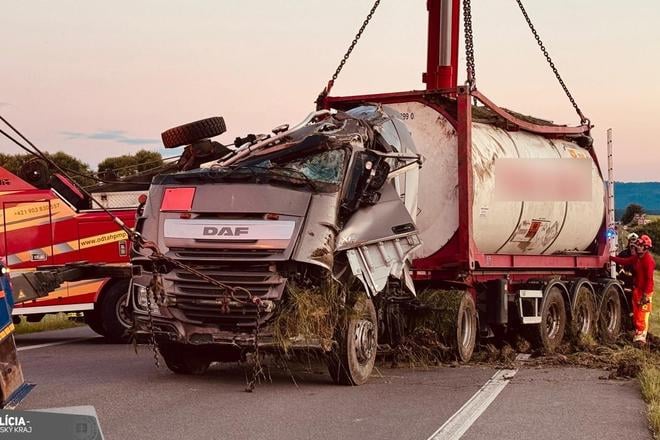Despite stiff penalties for driving without mandatory car insurance in Slovakia, roughly 9 percent of the country’s vehicles—about 320,000—still roam the roads uninsured. This figure, revealed by the Supreme Audit Office (NKÚ), dwarfs neighbouring countries like the Czech Republic and Poland, where only 1.6 percent and 1 percent of cars, respectively, are uninsured.
The reason, according to insurance companies, lies in Slovakia’s lax enforcement of penalties, writes Index magazine. While fines ranging from €16.60 to €3,320 are theoretically in place, many drivers see little consequence for failing to comply. Initiatives to address this problem, driven by the National Bank of Slovakia and the Slovak Insurers’ Bureau (SKP), have repeatedly stalled due to a lack of political backing.
The Interior Ministry acknowledges the flaws in the system and says reform efforts are underway.
“We are closely working with the Finance Ministry and consulting models from other countries, such as the Czech Republic,” a ministry spokesperson said.
Learning from the Czechs
The Czech Republic’s approach has been lauded as an effective deterrent.
There, uninsured drivers face a daily fine based on the engine size of their vehicle. For instance, an uninsured Škoda Fabia owner would incur a fine of 35 Czech korunas (about €1.40) a day, which accumulates to €507 over a year. Meanwhile, the average annual insurance premium for the same car in the Czech Republic is only €135, creating a financial incentive to comply with the law.
These fines are funnelled into a guarantee fund used to compensate victims of accidents caused by uninsured vehicles.
If a driver ignores repeated fines, the Czech Insurers’ Bureau escalates the matter to court, leading to additional costs and ensuring compliance.
Legislative roadblocks
Efforts to replicate the Czech model in Slovakia hit a wall during the last parliamentary term. Legislators from the OĽaNO party proposed a bill inspired by the Czech system, which included a grace period allowing uninsured drivers to either purchase insurance, or deregister their vehicle without penalty after six months.
The bill also sought to channel fines into Slovakia’s guarantee fund. The guarantee fund is currently financed by the country’s insurance companies. In 2023, insurers contributed €10 million to the fund. However, this model is unsustainable in the long term, according to the Slovak Insurers’ Bureau, which cites the growing cost of damage compensation each year.
Yet, the proposed reforms were sidelined in a crowded legislative agenda just before the 2023 parliamentary elections. As a result, Slovakia continues to struggle with weak enforcement, while uninsured vehicles remain a persistent problem.
Gaps in enforcement
The sheer volume of uninsured vehicles reported to district offices—over 300,000 each year—far outstrips the number of penalties issued. Only about 5,000 to 6,000 fines are imposed annually, with the average fine coming out to a modest €110. Of the €3.8 million in fines handed out over the last five years, less than half has been collected.
Compounding the issue is the outdated method used to track uninsured vehicles. Incredibly, the Slovak Insurers’ Bureau still delivers lists of uninsured cars to district offices on CDs due to the country lacking an online information system.
“The mandatory car insurance system has stalled in time and it's so absurd that it can demotivate responsible, paying drivers,” the NKÚ commented in a recent report.
The problems are exacerbated by under-resourced district offices. In Bratislava, for instance, a single official was tasked with processing more than 300,000 cases over six years, while in smaller districts like Nové Mesto nad Váhom, western Slovakia, the caseload amounted to just 42,000 in the same period. According to the Supreme Audit Office, more than 20 district offices in Slovakia do not address fines for uninsured drivers at all due to a lack of personnel.
“It's up to the decision of the official which case will be processed and what financial penalty will be imposed on the offender,” the NKÚ also notes in the report.
Reform in sight?
The Interior Ministry says it is working on a plan to digitise and automate the process, but details are scant.
“We are committed to modernising the system,” the ministry has assured, though no timeline has been given for when improvements might be implemented.
Adding to the complexity is the lack of a standardised fine structure. This allows for wide variations in penalties, with some officials imposing fines as low as €32.76 in Košice, while in Prešov, fines often exceed €221.
The cost of inaction is steep. The NKÚ, which reviewed 28 district offices, estimates that if the government had pursued all reported cases of uninsured drivers, the state could have collected an additional €100 million in revenue over the past six years.



 A lorry with a tank trailer crashed on Route I/65 in the Turčianske Teplice district on June 14, 2024. (source: Žilina Regional Police)
A lorry with a tank trailer crashed on Route I/65 in the Turčianske Teplice district on June 14, 2024. (source: Žilina Regional Police)